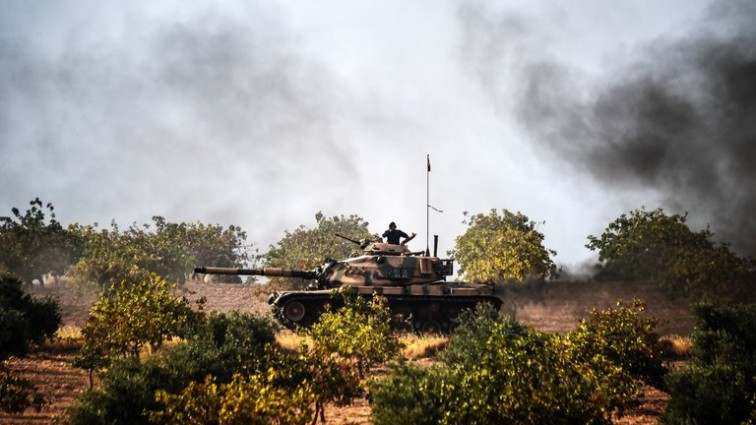Knowing the Risks, Some Syrian Rebels Seek a Lift From Turks’ Incursion

BEIRUT, Lebanon — The rebel fighter, a former major in the Syrian Army, thought he had finally found what he was looking for: a group with strong international backing that was gearing up for an offensive against his two most hated enemies, the Syrian government and the Islamic State militant group.
But within days of crossing into Syria, backed by Turkish planes, tanks and special forces troops and American warplanes, the fighter, Saadeddine Somaa, found himself fighting Kurdish militias that, like him, counted the Islamic State and the government of President Bashar al-Assad among their foes.
That was because the Turks, who supplied the weapons and the cash, were calling the shots, and they considered the Kurds enemy No. 1. The Kurds, for their part, consider Turkey an enemy, and so as the Turkish-led troops advanced, the Kurdish militias attacked.
For all the hope the new offensive had inspired in Mr. Somaa and other Syrian insurgents, it showed once again how even rebels fighting against the Islamic State and Mr. Assad — both targets for defeat under stated American policy — remain dependent on backers who only partly share their goals.
“Everyone is pursuing their own interests, not Syria’s,” he said in a long telephone interview from Jarabulus, the border town the Turkish-led force took from Islamic State, known also as ISIS or ISIL, on the first day of the offensive. “The problem is the same everywhere in Syria.”
In an ideal world, he said, groups like his — a collection of insurgent groups that oppose the government and ISIS and reject Al Qaeda — would unite in a single body, fight the government and all extremist groups, and preserve the institutions of the Syrian state for the future.
hem, and keep fighting and fighting each other, and this might take years.”
Syria’s Paradox: Why the War Only Ever Seems to Get Worse AUG. 26, 2016
With Operation in Syria, Erdogan Shows His New Power Over Turkey’s Military AUG. 25, 2016
Kurds Close to Control of Northeast Syria Province, Portending a Shift in the War AUG. 23, 2016
Mr. Somaa was identifying with insurgent groups that brand themselves as the Free Syrian Army, including many army defectors like himself. Many, but not all, of the groups have been vetted by, and receive covert support from, the C.I.A. and allied intelligence agencies. Their members range from secular to Islamist, with the United States drawing the line at hard-line groups like Ahrar al-Sham and more radical groups like the former Nusra Front, affiliated with Al Qaeda.
Mr. Somaa’s conundrum summed up why the new offensive has been at best a mixed bag for the C.I.A.-vetted Syrian rebels. It gives them a rare morale boost and a chance to show their countrymen they can rescue them and prove to foreign backers that, like the Kurdish groups, they can be effective partners on the ground against ISIS.
But it also puts them at the center of the newest complication in an already confused battlefield, fighting among forces backed by Turkey and the United States, fellow NATO members and putative allies that are supposedly united in the fight against Mr. Assad and ISIS. The Kurdish militias are backed by the Pentagon, which considers them its most reliable ally against the Islamic State.
Some Syrian Arab insurgents have already been caught on video apparently abusing Kurdish militia members, and as the operation becomes more contentious, rebels who had sought to increase their legitimacy as a Syrian force risk reinforcing criticism that they are Turkish and American proxies at best, de facto allies of ISIS at worst.
Mr. Somaa blamed the Kurds for the fighting, saying they had failed to retreat from territory west of the Euphrates River that they had promised to leave just days before, as they were urged to do by Vice President Joseph R. Biden Jr.
“Our main target was Daesh,” he said, using an Arabic acronym for the Islamic State, but when the Kurdish-led militias attacked, “we retaliated.” He said that his group, Faylaq al-Sham, had taken several prisoners from among the Kurdish fighters.
Политика конфиденциальности | Правила пользования сайтом









